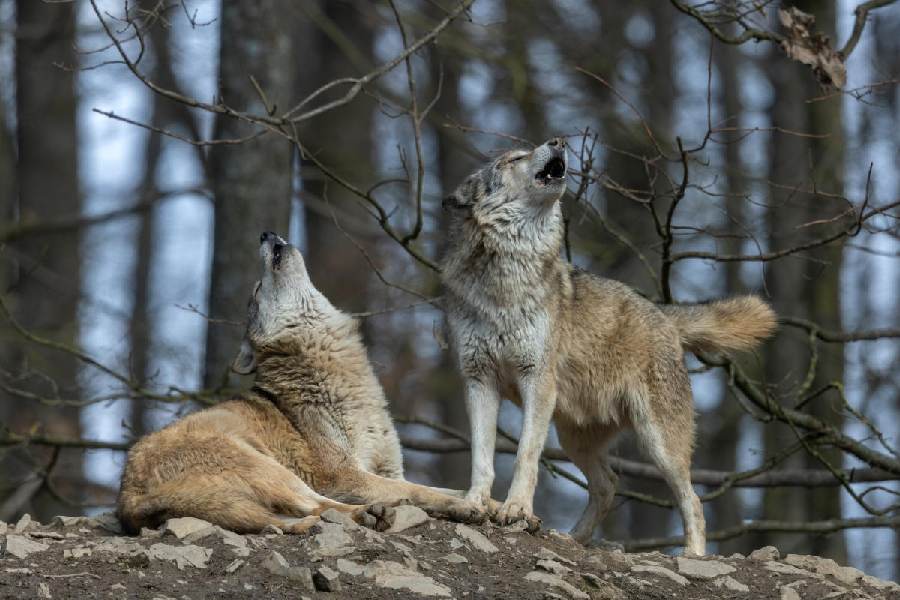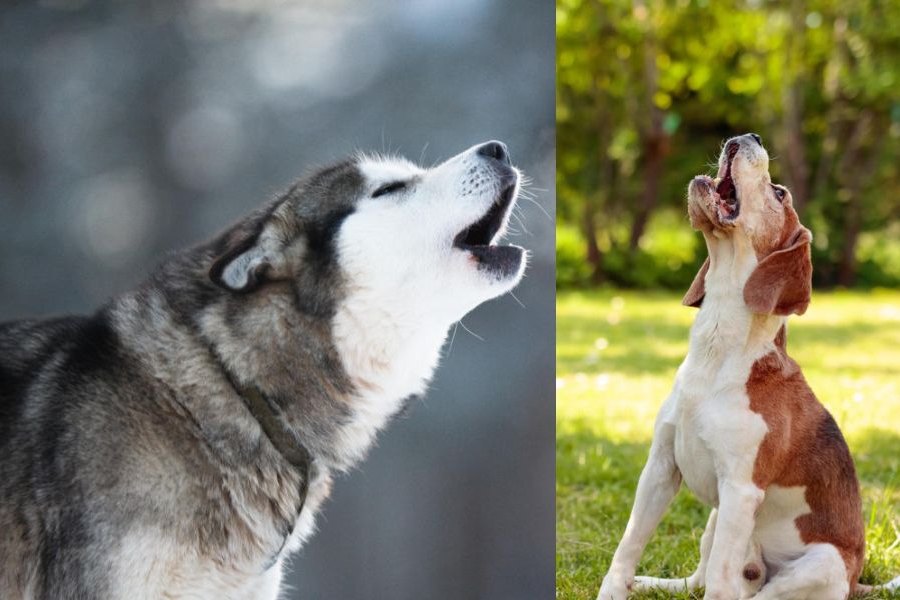Does your furry friend burst into howls suddenly? Does he sound like a lone wolf, sometimes wailing and sometimes channelising his inner Pavarotti? Dog howling can be a baffling but also adorable behaviour and a recent study has tried to unravel its mysteries.
When Hungarian animal behaviourist Fanni Lehoczki noticed the frequent howls of her Siberian Husky Bizsu didn’t always provoke other dogs into a wolf-like response, it prompted the question — why are certain dogs more prone to howling?
Researchers at Budapest’s Eotvos Lorand University, where Lehoczki works, examined whether certain dog breeds are more prone to howling and if this had anything to do with their genetic closeness to wolves.

Noisy forefathers: Two Canadian timberwolves howling in a forest
Lehoczki and her team examined how a dog’s breed, age, and sex impacted its reaction to howling, by testing 68 purebred family dogs by playing three-minute recordings of wolf howls and observing their reactions.
The dogs in the experiment belonged to 28 different breeds ranging from ancient breeds such Shiba Inu, Siberian Husky, Alaskan Malamute, and Pekingese, to Bull Terriers and Boxers.
The main finding of Lehoczki’s team was that those breeds which are genetically closer to wolves are more prone to respond with howling, and they also show more stress signals than dogs which are less related to wolves. This was true only for dogs older than five years.
Among younger dogs there was no difference between the breeds, so researchers will examine this aspect further.
Older dogs of more ancient breeds responded with longer howls and showed more stress-related behaviours too, while more modern breeds seemed to react with barking.
The research also concluded that breeds which tend to howl more also show more stress-related behaviour such as yawning, shaking their body, licking their mouth, or scratching the body.
The study is the first specifically investigating howling in domestic dogs. “Domestication and selective breeding by humans fundamentally changed dogs’ vocal repertoire and both the perception and production of howling in dogs,” it concluded.
More than just barking
Vet Subir Bhattacharya, who sits at Pets Planet in Falguni Market and Animal Pride in BE Block, says it is natural for dogs to howl. “Dogs are pack animals which play, quarrel, and hunt together. The sounds they make to communicate with one another are grossly termed as barking but it can be classified into many types of sounds,” he explained.
A whimper, he said, is a high-pitched sound made when seeking attention, scared, locked in a room etc. Whining is a short, high-pitched yelp made in pain whereas a growl is a low-pitched sound made when threatened. A grunt is a content, relaxed sound usually exhibited by elderly dogs, and panting is the sound created after a long run or fight.
“Smaller dogs tend to be noisier due to their inherent physical inferiority but then all dogs can make sounds, whether domestic, in the wild or the street,” says Bhattacharya, before explaining the howl. “The howl is a long-lasting sound made by dogs. Pack animals do this in preparation before going hunting.”
Pet owners don’t seem to mind the occasional howl. Some of them love it! Mousumi Das of EC Block says her Husky Google not just howls but that his vocalisation almost sounds like human speech. “Google howls and speaks more than he barks. He howls if we praise our other dog — Golden Retriever Bruno — in front of him. He howls if we forget to give him his after-dinner treat. When I say ‘I love you’ to him, he replies and it sounds very much like ‘I love you’ too,” says Das.
Her Retriever, however, has never howled.
In AG Block, Sanjukta Saha too says their Husky Tiger rarely barks. Rather, he howls to communicate. “He’ll howl if someone new walks into the house,” she says. “ Tiger looks like a wolf and we often hear children on the street asking their parents if he is one. So clearly, his howl comes from his wolfish ancestry too.”
The Sahas also have three Beagles, another breed prone to howling. “The Beagles howl if someone on the road suddenly approaches to pet them,” Sanjukta says. “It’s what makes these breeds unique.”











